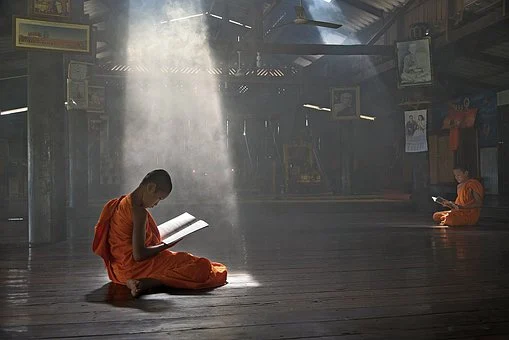There is a revealing scene in Jane Campion’s mesmerizing movie Bright Star, which concerns the evolution of the intense love affair between the poet John Keats and his next-door neighbor the seamstress Fannie Brawne in early 19th century England. During one of their lessons together in which Keats is teaching Brawne about the essence of poetry, he tells her that a poem needs to be understood through the senses. Using the example of someone diving into a lake, he reminds her that the point of diving into the lake is to be in the lake; to luxuriate in the sensation of water, not to work the lake out with one’s thoughts.
David Bohm, the renowned twentieth century physicist who contributed greatly to our understanding of quantum theory, particularly how subatomic particles existing at a distance from each other may be entangled, and who was also a close associate of Albert Einstein, wrote in his book Wholeness and the Implicate Order of how our experience of the world can become fragmented and unreal when it is based on our mistaking the content of our thoughts for our experience of the world as it is.
One of the things which Bohm was addressing was how words and thoughts by themselves can prevent us from perceiving our world more clearly because the word is never the thing itself, and because our system of thought and language has inherent limitations which can prevent us from not only discovering what is real, but likewise from perceiving the details and dynamics of our world within a more expansive context.
Bohm likewise addresses in his book the essential difference between intelligence and thought; referring to thought as a product of all of our conditioned responses of memory, while intelligence is an act of perception, rather than a process of thought, in which in a flash of understanding somebody is able to immediately perceive the actual irrelevance of their whole way of thinking about a certain problem, and instead apprehend it directly through a fundamentally different approach in which all of the different elements of the problem fit into a new order and a new structure.
If one is in fact in agreement with Bohm on this issue, then a logical first step in integrating emotion and sensorial reactions into a larger intelligence, one born of direct insight and creative absorption, would be to explore the limitations of thought. Otherwise, it would seem, the thinking mind might continue to be a barrier necessarily controlling and eventually limiting the sort of immediate perception of our world to which Bohm refers.
In likewise addressing the dynamic of immediate perception, one born of direct insight, the famous twentieth century philosopher and thinker J. Krishnamurti contrasted knowledge with intelligence; the former being something that is generated only through the assimilation of facts and information, while the latter is a process in which one is capable of seeing the essence of something in a flash exactly because they are free from the energy draining activities of thought.
Yet how could we possibly perceive and then understand the limitations of our thinking mind if our actual stream of thought is being continually fragmented and interrupted by the essential nature of the Internet, one which as we jump around on it from one site to another, is increasingly making it extremely difficult, if not impossible, to follow our thoughts to a point of completion?
My latest book Toward a Holistic Intelligence: Life on the Other Side of the Digital Barrier is being published in December, 2021 by Rowman & Littlefield.
